News

December 1, 2023
Berkeley Lab’s Energy Technologies Area staff have provided technical support to the Efficient and Healthy Schools Program since its launch in 2021. The team supporting this program includes staff from Berkeley Lab’s Energy Technologies Area who helped design and administer the program, including technical assistance and recognition for schools and districts. The program team works...
Read more
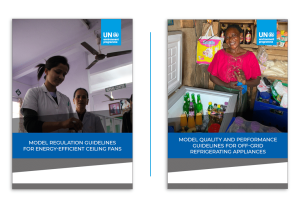
November 13, 2023
As the world copes with more extreme heat because of climate change, the need for efficient cooling devices is more pressing than ever. Lawrence Berkeley National Laboratory (Berkeley Lab) is co-leading an effort to create global equipment guidelines that serve the places where this equipment is needed most. In October, the Lab and the United Nations Environment Program’s United for Efficiency...
Read more

November 13, 2023
Several employees in the Energy Technologies Area were honored in this year’s Director’s Awards at the U.S. Department of Energy's Lawrence Berkeley National Lab (Berkeley Lab). The Lab’s Director’s Awards program recognizes employees’ accomplishments, leadership, collaboration, multi-disciplinary science, cross-divisional projects, and commitment to excellence in support of the Lab’s...
Read more

November 7, 2023
Physicist Senior Scientist Vassilia Zorba, leader of the Laser Technologies Group in the Energy Storage and DIstributed Resources Division at Lawrence Berkeley National Laboratory (Berkeley Lab), has been recognized by multiple field-leading groups as a key figure in optics and photonics today. The professional society Optica (formerly OSA) – one of the largest in the field with 24,000 members,...
Read more
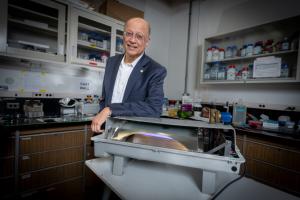
October 24, 2023
During a ceremony at the White House today, President Biden awarded Lawrence Berkeley National Laboratory (Berkeley Lab) retired Faculty Senior Scientist Ashok Gadgil the National Medal of Technology and Innovation, the nation’s highest honor for technological achievement. His award is “for providing life-sustaining resources to communities around the world. His innovative, inexpensive...
Read more
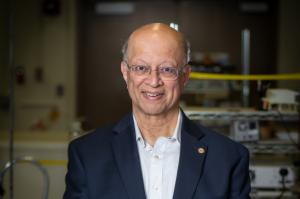
October 24, 2023
Growing up in Mumbai, India in the 1950s, Ashok Gadgil remembers his small apartment overflowing with books. “My dad was a member of a number of libraries and he would bring in a dozen books at a time,” he fondly recalls. These early experiences contributed to his growing curiosity and awareness of the world, and subsequently, his interest in science. Gadgil earned degrees in physics from the...
Read more
October 20, 2023
By harnessing the power of AI and machine learning, Lawrence Berkeley National Laboratory scientists are developing a tool that predicts properties of high-potential, bio-based molecules and fuels, paving the way for cost-effective and sustainable jet fuel production. This innovation offers a promising short-term solution to reduce emissions. This video originally appeared at the Berkeley Lab News...
Read more
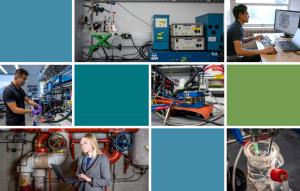
October 9, 2023
Hydrogen, the smallest element in the universe, has huge potential as a clean energy source. Using hydrogen (H2) as a fuel and as a means of storing energy could reduce our dependence on petroleum and help us reduce air pollution and greenhouse emissions to meet our goals for a cleaner and better climate. However, adopting hydrogen power on a large scale requires advances in technology and the...
Read more

October 3, 2023
Researchers at Lawrence Berkeley National Laboratory (Berkeley Lab) will receive more than $9.7 million in federal funding to enhance the cybersecurity of our nation’s clean energy infrastructure. The award comes from the U.S. Department of Energy’s (DOE) Office of Cybersecurity, Energy Security, and Emergency Response (CESER) as part of a $39 million package distributed across nine innovative...
Read more
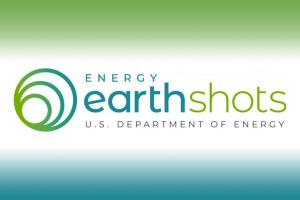
September 29, 2023
The Department of Energy’s Lawrence Berkeley National Laboratory (Berkeley Lab) will host two new centers dedicated to advancing clean energy technology and combating climate change. The awards are part of DOE’s Energy Earthshots Initiative that launched in 2021 with the goal of speeding up technological breakthroughs and lowering costs. DOE has so far launched seven Earthshots spanning clean...
Read more

September 27, 2023
The U.S. Department of Energy (DOE) has announced up to $25 million to help six teams across the nation develop affordable, equitable, and reliable clean energy systems in their communities. The funding comes through the Clean Energy to Communities (C2C) partnerships program, an initiative designed to support local decarbonization strategies. Lawrence Berkeley National Laboratory (Berkeley Lab) is...
Read more

September 27, 2023
China has implemented reforms in its electricity markets as part of its goal to reach carbon neutrality by 2060, but the country has not fully realized the potential cuts in emissions. Recent work led by Jiang Lin of Lawrence Berkeley National Laboratory (Berkeley Lab) helped explain why. The “results begin to fill a notable gap in our understanding of what mediates the effectiveness of...
Read more
September 27, 2023
Energy efficiency improvements in buildings could save the United States more than $100 billion in the effort to cut carbon emissions, according to a recent analysis from Lawrence Berkeley National Lab (Berkeley Lab). That striking figure and other highlights from the "U.S. Building Sector Decarbonization Scenarios to 2050" report are the subject of a new blog post from the Natural Resources...
Read more
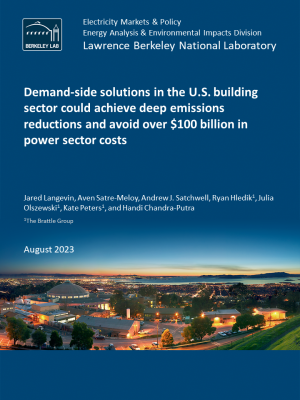
September 20, 2023
What would an efficient and decarbonized buildings sector look like in 2050? A new study from the U.S. Department of Energy’s Lawrence Berkeley National Laboratory (Berkeley Lab) quantified up to a 91% reduction in carbon emissions from buildings with a combination of energy efficiency, demand flexibility, electrification measures, and a decarbonized grid. Berkeley Lab researchers, in...
Read more
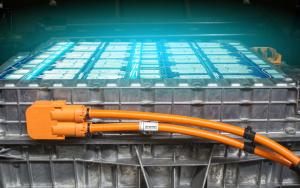
September 11, 2023
A consortium of the nation’s best battery scientists, led by Lawrence Berkeley National Laboratory (Berkeley Lab), will accelerate the commercialization of a new family of battery cathode materials called DRX or “disordered rock salt.” DRX cathodes could provide batteries with higher energy density than conventional lithium-ion battery cathodes made of nickel and cobalt, two metals that are...
Read more
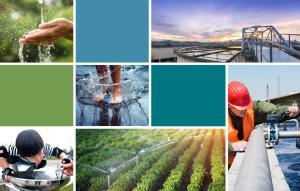
September 6, 2023
Innovative water treatment and desalination technologies hold promise for building climate resilience, realizing a circular water economy, and bolstering water security. However, more research and development is critical not only to radically lower the cost and energy of such technologies, but to effectively treat unconventional water sources. Conventional water supplies, such as fresh water and...
Read more
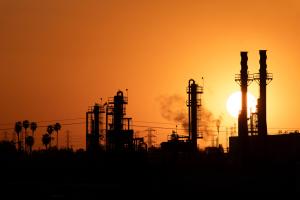
August 29, 2023
Researchers from Lawrence Berkeley National Laboratory (Berkeley Lab) and the Center for Law, Energy, and the Environment (CLEE) at the UC Berkeley School of Law are leading a project to explore the creation of a Direct Air Capture (DAC) facility that uses cutting-edge technologies to remove carbon dioxide from the atmosphere in California’s Southern San Joaquin Valley (SSJV). This foundational...
Read more

August 24, 2023
Two innovative technologies from the Energy Technologies Area (ETA) are among four at the U.S. Department of Energy’s Lawrence Berkeley National Laboratory (Berkeley Lab) that have been honored with a 2023 R&D 100 Award. The award, presented by R&D Magazine and selected by an independent panel of judges, recognizes the year’s 100 most innovative and disruptive technology products from...
Read more
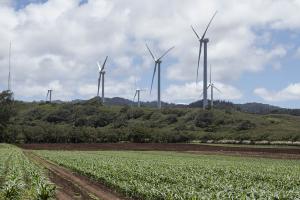
August 24, 2023
Wind energy continues to see growth, solid performance, and attractive prices in the U.S., according to a report released by the U.S. Department of Energy (DOE) and prepared by Lawrence Berkeley National Laboratory (Berkeley Lab). With levelized costs averaging under $40 per megawatt-hour (MWh) for newly built projects, the cost of wind is well below its grid-system, health, and climate value....
Read more

August 23, 2023
Since early July, the Earth has sweltered under record-breaking heat. In the United States, from California and the Desert Southwest to Texas and Florida, a long-lasting heat wave in the triple digits has broken dozens of heat records – and counting. To mitigate the risks of living in extreme heat, scientists at the Department of Energy’s Lawrence Berkeley National Laboratory (Berkeley Lab)...
Read more
August 22, 2023
Across the United States, hundreds of microgrids provide power independently of regional electric grids. These facilities, which often include solar panels backed by battery energy storage, can help keep the power on locally while easing stress on the larger grid when demand is high or outages strike. A recent feature in The New York Times spotlighted microgrids in real estate development,...
Read more

August 9, 2023
In rooms where smoking has taken place regularly, tobacco’s imprint lingers on indoor surfaces, even long after regular smoking has stopped. The leftover residues, known as thirdhand smoke, can be a long-term source of indoor pollutants. New research from a team led by the Department of Energy’s Lawrence Berkeley National Laboratory (Berkeley Lab) zeroes in on carpets as an especially potent...
Read more

August 4, 2023
Mary Ann Piette, whose research has been foundational to improving energy efficiency of existing buildings and integrating flexible building technologies with the electric grid, has been appointed Associate Laboratory Director (ALD) of the Energy Technologies Area (ETA). The appointment, which took effect August 2, follows a national search. Piette has served as the interim ALD of ETA since...
Read more
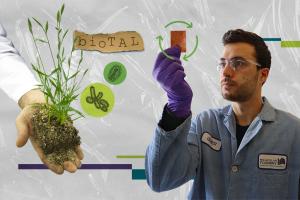
July 27, 2023
Plastic waste is a problem. Most plastics can’t be recycled, and many use finite, polluting petrochemicals as the basic ingredients. But that’s changing. In a study published today in Nature Sustainability, researchers successfully engineered microbes to make biological alternatives for the starting ingredients in an infinitely recyclable plastic known as poly(diketoenamine), or PDK. The...
Read more

July 18, 2023
Researchers are hard at work on ways to make buildings more energy-efficient and user-friendly as part of net zero carbon emissions energy systems. That means things like windows and walls that take advantage of nature to heat and cool, better batteries to store and deliver energy when needed, and systems that can adapt to changes from the electrical grid. What would it look like to combine all of...
Read more